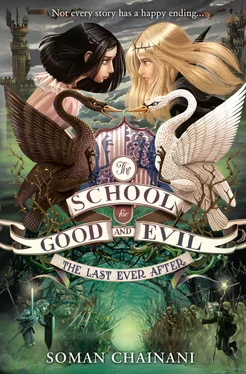Callis put the bowl in front of Agatha. “No one likes toad soup cold.”
Agatha bucked up. “Look, I know it’s crowded with him here. But Tedros and I can get work in the village. Think about it, if we save up enough, maybe we can all move to a bigger house, maybe even something in the cottage lanes.” Agatha grinned. “Imagine, Mother, we could actually have living neighbors—”
Callis fixed her with a cold, brown stare and Agatha stopped talking. She followed her mother’s eyes to the small, slime-crusted window over the sink. Agatha pushed out of her chair, bowl untouched, and grabbed a wet dishtowel from the rack. Pressing against the glass, she scraped at the gray smear of dust, grease, and mildew, until a stream of sunlight pierced through. Agatha backed away in surprise.
Down the snow-coated hill, bright red flags billowed from every lamppost in the square:
“Witch?” Agatha choked, gaping at a hundred reflections of her own face. Beyond the square, the colorful storybook houses, decimated by attacks from the Woods, had been rebuilt as monotonous stone bunkers. A phalanx of guards in long black cloaks and black-iron masks carried spears, patrolling the cottage lanes and forest perimeter. Dread rising, Agatha’s eyes slowly fell on the spot where her and Sophie’s statues once glistened near the crooked clock tower. Now there was only a raised wooden stage, with a giant pyre made of birches, two flaming torches fixed to the scaffolding, and a banner of her and Sophie’s faces hanging between them.
Agatha’s stomach dropped. She’d escaped a public execution at school only to find one at home.
“I warned you, Agatha,” her mother said behind her. “The Elders believed Sophie a witch who brought the attacks from the Woods. They ordered you not to go after her the night they surrendered her to the attackers. The moment you disobeyed them, you became a witch too.”
Agatha turned, her legs jellying. “So they want to burn me?”
“If you’d come back alone, the Elders might have spared you.” Callis was sitting at the table, head in hands. “You could have taken punishment, like I did for letting you escape.”
A chill went up Agatha’s spine. She looked at her mother, but there were no wounds or marks on her hooked-nose face or gangly arms; all her fingers and toes were intact. “What did they do to you?” Agatha asked, terrified.
“Nothing that compares to what they’ll do to you both when they find him.” Callis looked up, eyelids raw. “The Elders always despised us, Agatha. How could you be so stupid to bring someone back from the Woods?”
“The s-s-storybook said ‘The End,’” Agatha stuttered. “You said it yourself—if our book says ‘The End,’ this has to be our happy ending—”
“Happy ending? With him?” Callis blurted, jolting to her feet. “There is a reason the worlds are separate, Agatha. There is a reason the worlds must be separate. He will never be happy here! You are a Reader and he is a—”
Callis stopped and Agatha stared at her. Callis quickly turned to the sink and pumped water into a kettle.
“Mother …,” Agatha said, suddenly feeling cold. “How do you know what a Reader is?”
“Mmm, can’t hear you, dear.”
“A Reader,” Agatha stressed over the strident cranks. “How do you know that word—”
Callis pumped louder. “Must have seen it in a book, I’m sure …”
“Book? What book—”
“One of the storybooks, dear.”
Of course, Agatha sighed, trying to relax. Her mother had always seemed to know things about the fairy-tale world—like all parents in Gavaldon who had feverishly bought storybooks from Mr. Deauville’s Storybook Shop, hunting for clues about the children kidnapped by the School Master. One of the books must have mentioned it, Agatha told herself. That’s why she called me a Reader. That’s why she wasn’t surprised by a prince.
But as Agatha glanced up at Callis, back to her, pumping water into the kettle, Agatha noticed that the pot was already full and overflowing into the sink. She watched her mother staring off into space, hands clenched, pumping water faster, faster, as if pumping memories away with it. Slowly Agatha’s heart started to constrict in her chest, until she felt that cold sensation deepening … whispering that the reason her mother wasn’t fazed by Tedros’ appearance wasn’t because she’d read storybooks … but because she knew what it was like to live through one …
“He returns to the Woods as soon as he wakes,” Callis said, releasing the pump.
Agatha wrenched out of her thoughts. “The Woods? Tedros and I barely escaped alive—and you want us to go back?”
“Not you,” said Callis, still turned. “Him.”
Agatha flared in shock. “Only someone who’s never experienced true love could say such a thing.”
Callis froze. The skeleton clock ticked through the loaded silence.
“You really believe this is your happy ending, Agatha?” Callis said, not looking at her.
“It has to be, Mother. Because I won’t leave him again. And I won’t leave you,” Agatha begged. “I thought maybe I could be happy in the Woods, that I could run away from real life … but I can’t. I never wanted a fairy tale. All I ever wanted was to wake up every day right here, knowing I had my mother and my best friend. How could I know that friend would end up being a prince?” Agatha dabbed at her eyes. “You don’t know what we’ve been through to find each other. You don’t know the Evil that we left behind. I don’t care if Tedros and I have to stay trapped in this house for a hundred years. At least we’re together. At least we’ll be happy. You just have to give us the chance.”
Quiet fell in the sooty kitchen.
Callis turned to her daughter. “And Sophie?”
Agatha’s voice went cold. “Gone.”
Her mother gazed at her. The town clock tolled faintly from the square, before the wind drowned it out. Callis picked up the kettle and moved to the wooden stove. Agatha held her breath, watching her spark a flame beneath the pot and stew a few wormroot leaves in, circling her ladle again and again, long after the leaves had dissolved.
“I suppose we’ll need eggs,” said her mother at last. “Princes don’t eat toads.”
Agatha almost collapsed in relief. “Oh thank you thank you thank you—”
“I’ll lock you both in when I go to town each morning. The guards won’t come here as long as we’re careful.”
“You’ll love him like a son, Mother, you’ll see—” Agatha grimaced. “Into town? You said you had no patients.”
“Don’t light the fireplace or open the windows,” ordered Callis, pouring two cups of tea.
“Why won’t the guards come here?” Agatha pushed. “Wouldn’t it be the first place they’d check?”
“And don’t answer the door for a soul.”
“Wait—what about Stefan?” Agatha asked, brightening. “Surely he can talk to the Elders for us—”
Callis whirled. “Especially not Stefan.”
Mother and daughter locked stares across the kitchen.
“Your prince will never belong here, Agatha,” said Callis softly. “No one can hide from their fate without a price.”
There was a fear in her mother’s big owl eyes that Agatha had never seen before, as if she was no longer talking about a prince.
Agatha crossed the kitchen and wrapped her mother in a deep, comforting hug. “I promise you. Tedros will be as happy here as I am,” she whispered. “And you’ll wonder how you ever could have doubted two people so in love.”
A clang and clatter echoed from the bedroom. The curtain drew back behind them before collapsing entirely, and Tedros lumbered through, groggy, red-eyed, and half-naked with a torn, bloodied piece of bedsheet stuck haplessly over his wound. He sat down at the counter, smelled the soup and gagged, shoving it aside. “We’ll need a sturdy horse, steel-edged sword, and enough bread and meat for a three-day journey.” He looked up at Agatha with a sleepy smile. “Hope you said your goodbyes, princess. Time to ride to my castle.”
Читать дальше












